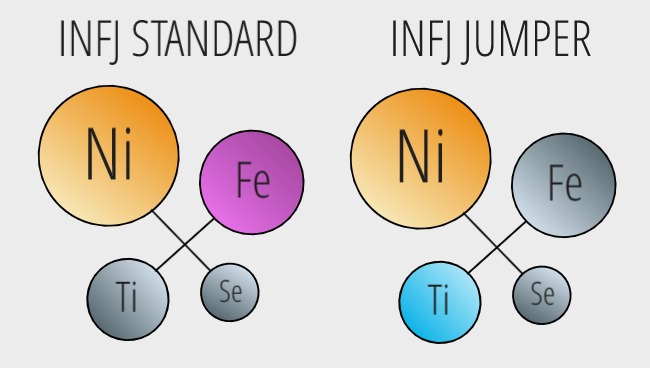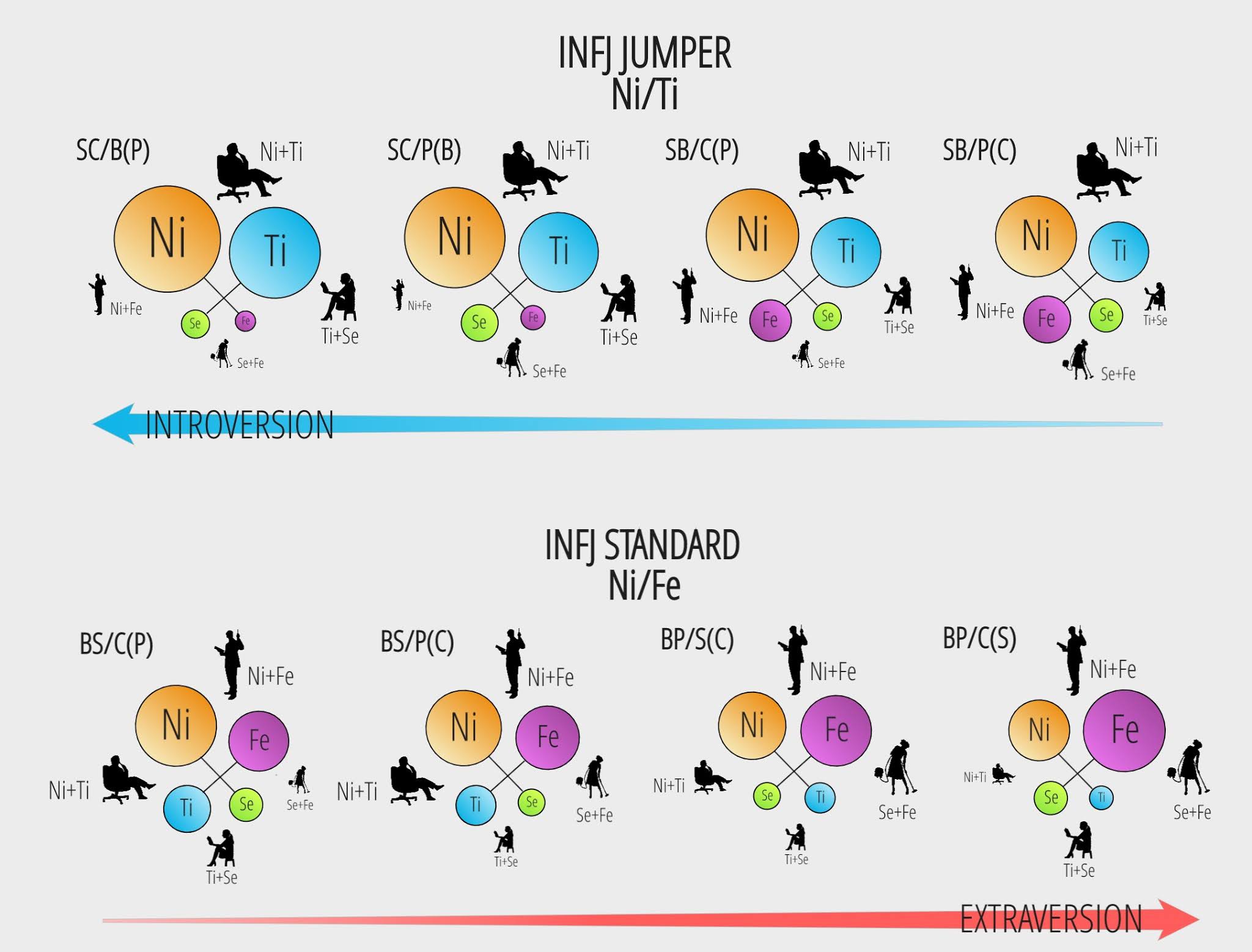When I first read the description of an INFJ, I immediately realized that the test I'd taken had hit the mark. And the more I read about other types the more sense it made. I felt sort of insulted, though, since in a way, I didn't view myself as a "feeler", but deep down I realized that this was the type for me. It simply was the best fit.
But as time went on my box started to feel uncomfortable. Sure, many of the behaviors described as typical to the INFJ perfectly matched my own, but others didn't. There could be no doubt of the order and strength of my cognitive functions - auxiliary Extraverted Feeling and tertiary Introverted Thinking being the ones causing the confusion here - but something was still off. I knew it.
And when I stumbled upon Objective Personality's concept of "Jumpers" it all clicked.
Extraverted Feeling is my second and second most powerful cognitive function, yes, but I don't respect it. It's not a savior.
My heart's not in it, as they say.
But don't get me wrong, it is powerful! It slaps me the hell around whenever I interact with new people and I don't like it one bit. I use to tell people I can't count my change when the clerk's watching (not that anyone is counting change anymore, but still). I literally can't think when someone else is watching and it's painfully obvious that information has to pass through Fe to get to Ti in these kinds of situations.
INFJ Career Advice
So... what's all this got to do with career advice?
Well... to be Frank, I really don't fancy being a Social Worker. I don't want to work in Health Care. Perhaps I could work as a Therapist, but would I do it out of a burning desire to connect with and help my client or because the theories interest me and I want to prove I'm right? I think the latter.
I believe it was while watching this video...
...where Frank James suggests I'll never be happy with a job that doesn't allow for communication, that I really started questioning my being what one might call a "poster child INFJ".
And now that I'm familiar with the OP system I realize that what the good Frank is actually describing here is an INFJ in Blast-mode (the OP animal Blast), which admittedly would fit most INFJs (4 out of 8 subtypes lead with Blast and 2 has it second), but not all.
Some of us are just "Sleeping" 😉
But we're getting ahead of ourselves...
INFJ Subtypes
Let's start by dividing the INFJ into subtypes here.
Inside the four letter MBTI acronym of INFJ - if we are to believe Dave and Shan over at Objective Personality - we have 2 subtypes: let's call them "INFJ Standard" and "INFJ Jumper".
Jumpers
What this concept of "Jumpers" effectively boils down to is basically a matter of respect. When it comes to our second and third cognitive functions, roughly half of us "choose" to respect our third function in place of our second. A respected function is called a "Savior" and a disrespected function a "Demon". The "INFJ Standard", thus, respects its two savior functions Ni and Fe, while the "INFJ Jumper" instead respects Ni and Ti. This pushes the Jumper out towards the ends of the Extraversion/Introversion-spectrum, effectively making her a "Double Introvert" or a "Double Extravert" depending on original type.
Human Needs
Another thing that's affected here is something Objective Personality has borrowed from Tony Robbins called the "Human Needs":
Are we primarily Gatherers, out and about exploring, or are we Organizers, staying in the safety of the camp, trying to get a grip on that which is already known? Are we primarily interested in ourselves, our inner world and our identity or are we more focused on the values or reasons of others? Are we Self above Tribe or Tribe above Self?
Jumping doesn’t change our primary Human Need. Our dominant function stays the same. The Ni-dominant INFJ Jumper, for example, will still, first and foremost, be an Organizer. But the change in the dichotomy of our mid-axis functions (going from Extraverted Feeling to Introverted Thinking) will change our secondary Human Need from Tribe above Self to Self above Tribe, which, I believe, has a major impact on our personalities and our preferences/suitability on the job market.
Animals
Further dividing these 2 subtypes using the Objective Personality concept of "Animals"...
...we get another 4 subtypes to each parent:
- Play (Extraverted Decider + Extraverted Observer):
Expending energy, Working, Doing, Showing off - Blast (Extraverted Decider + Introverted Observer):
Teaching, Controlling, Starting, Bragging - Consume (Introverted Decider + Extraverted Observer):
Learning, Taking in more, Respecting info, Filling - Sleep (Introverted Decider + Introverted Observer):
Preserving energy, Processing, Introspecting
OP Concepts and Career Paths
So... we've gone over the subtypes... how do they all fit in to the job market? Well, I've made an attempt at rating (on a scale from 1 to 10, 10 being the best fit) the professions listed above for each subtype:
Don't get hung up on the actual ratings here, it's the concept that matters (screw you inferior Se!)
Let me explain myself...
1. Healthcare
Title says it all doesn't it? You'll be working with "care". If your Fe-gun isn't loaded, that's not going to be a job for you. And the more Introverted you are (to the left in the table above) the harder a time you will have communicating with the people you're caring for. This one is definitely better suited to the Standard INFJ.
2. Social Worker
Perhaps not as intimate as the healthcare worker, but close enough. You need to genuinely want to help people (not indirectly through the tangles of your own identity) and you need good communication skills and a social battery that doesn't drain mid-sentence. Definitely INFJ Standard.
3. Life Coach
This one is a bit trickier, but I rated it the same since I'm of the opinion that a life coach needs a bit of "oumph" (Extraverted energy - a good dose of Blast and Play) to be able to puzzle their clients back together and motivate them to become go getters and warriors in mankind's ball-breaking struggle for survival. Winner: INFJ Standard.
4. Collaborative/Creative Writer
I had to split the writer profession in two. I believe there is a polarity to the writer skillset. On the one hand we have ideas, on the other execution. This category represents the creative, collaborative end of the spectrum and I'm giving it to the INFJ Standard.
5. Solitaire/Perfectionist Writer
As opposed to the creative writer, the solitaire writer will have no problem perfecting her prose. But muse might be lacking. This category represents the master craftmanship writer. First INFJ Jumper win.
6. Artist (as in painter/sculptor)
Perhaps this one should've been split up as well... I guess you can paint in herds, but that's just... in this case I've rated the lone artist and the winner is the INFJ Jumper.
7. Scientist
Sure, I guess we've left the era of the lone genius behind, but I still don't judge communication skills to be top priority for scientists. Perhaps it's a stereotypical way of looking at it, but... anyway... without the respected savior Ti I wouldn't recommend science at all. I mean, we all disrespect facts (inferior Se), but without the logic there's really no point even trying. INFJ Jumper win.
8. Counselor/Therapist
Well, as opposed to the life coach, I think a counselor or therapist would do well to listen more and energetically motivate less. To analyze the thoughts and feelings of their clients and be a bit restrained in the advice given. They still need to care, at least a bit. I think the subtypes hugging the mean might be best suited for this one. We have a tie.
9. Librarian
Same with this one I believe. A tie, that is. I librarian should be able to work alone, like to work alone even, but he/she should also be able to connect with and understand people enough to help them find what they're looking for, even if they themselves don't know what it is. A middle ground is definitely preferable here.
I hope I've managed to illustrate my point here, which is that the career advice normally given to INFJs is too general, one has two look at the finer grained subtypes in order to really hit the target.






Comments
Post a Comment